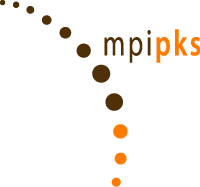
Atomic tunneling Systems and fluctuating Spins interacting with superconducting Qubits
Workshop Report
The workshop Atomic tunneling Systems and fluctuating Spins interacting with superconducting Qubits welcomed about 50 participants from 12 different countries at the Max Planck Institute for the Physics of Complex Systems. The purpose of the workshop was to discuss the physics of two-level tunneling systems and paramagnetic spin impurities, which are nowadays one of the major sources of decoherence in superconducting quantum circuits.
The workshop brought together experts in the fields of superconducting qubits, of two-level tunneling systems in amorphous solids, and of spin-glass physics. It was aimed to enhance the exchange of ideas, to advance the fundamental understanding, and to promote progress towards future applications in quantum computation and material science. Highlights of the workshop were several experimental and theoretical talks, which provided new and exciting results on the physics of two-level tunneling systems and paramagnetic spins in conjunction with superconducting quantum circuits. Beside oral presentations the workshop program included ample time for thorough discussions of particular aspects like the microscopic structure of the two-level systems in amorphous solids and their coupling to the microwaves. In addition, a very lively poster session enhanced the in-depth exchange of ideas and gave in particular the younger participants the opportunity to present their work.
Monday afternoon John Martinis gave a colloquium on “Fluctuations of Energy-Relaxation Times in Superconducting Qubits” in which he showed convincingly the telegraphic time dependence of the energy relaxation of qubits due to the interaction with neighboring systems and discussed possible practical solutions like recalibrating large registers of qubits in presence of the jumps. The talk was attended by a large number of people, including conference participants and institute members.
Beside the scientific program the participants of the workshop enjoyed a very nice guided tour in the Royal Castle and in the city of Dresden.
Overall the workshop contributed to the scientific exchange and generation of ideas in this lively research field and the participants expressed repeatedly that they found this workshop useful and enjoyable.
